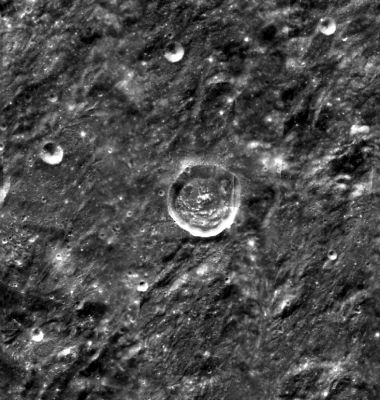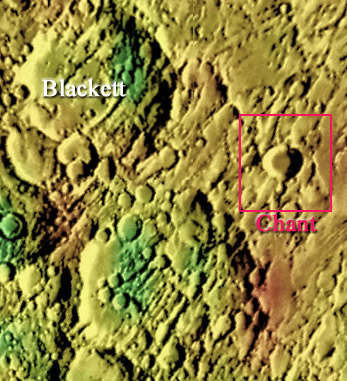Chant
Contents
Chant
|
Lat: 40.0°S, Long: 109.2°W, Diam: 33 km, Depth: km, Rükl: (farside), Upper Imbrian | |
Images
LPOD Photo Gallery Lunar Orbiter Images
Maps
(LAC zone 123D1) USGS Digital Atlas PDF
Description
Chant lies close to a pair of impressive-looking scarred craters Blackett and an unnamed crater (see Note 1 below) to its west. It's unique location also puts it some 150 km away north-west from the outer ring of the Mendel-Rydberg Basin and some 300 km away south-west from the Cordillera mountains; created from the Orientale Basin impact that occurred 3.75 to 3.2 bn years ago. The crater is of similar age to Orientale, however, from the Clementine image above it may be slightly younger as it seems to have formed on its ejecta blanket that totally dominates the region. Chant itself looks relatively fresh; showing a very dictinctive sharp rim, clean-cut inner walls, slumped material into some sectors of the crater, and hint of a small peak at its centre. The character of the floor looks very irregular in parts partiuclarly southwards; displaying a series of hills and low-level mountains that follow the curvature of the crater.- JohnMoore2
Description: Wikipedia
Additional Information
- Note 1: For such an obvious geological feature similarly affected by Orientale ejecta like Blackett to its north-west, there appears to be no name or lettered designation given to this crater.
Nearby craters, such as, Blackett, Mendel, Stetson, Fenyi, Steklov, Lippmann, all have associated lettered craters, however, this feature does not seem to be related to any of them. The feature's coordinates and diameter were approximated using LTVT, and these came in at Lat:43.82S, Long: 113.8W, 155 km Diam., respectively.- JohnMoore2
Nomenclature
- Clarence Augustus Chant (May 31, 1865 - November 18, 1956) was a Canadian astronomer and physicist. During his career he joined five expeditions to observe solar eclipses, including the 1922 expedition that tested Einstein's theory that light could be deflected by a massive body. He performed early investigations into X-ray photography. In 1928 he published the book, Our Wonderful Universe. Finally in 1935, after many years of labor and the financial backing of David Dunlap's family, his dreams of a world-class observatory for Canada were achieved with the opening of the David Dunlap Observatory.
- It's perhaps interesting to call the unnamed crater of Note 1 (see Additional Information, above) Dunlap.- DannyCaes Mar 31, 2011
LPOD Articles
Bibliography
Perhaps it's interesting to read (and to know) something about the legendary Meteor Procession of February 9, 1913 (the Canadian Fireball Procession, aka the Cyrillid shower), because it was investigated by C.A. Chant.- DannyCaes Feb 6, 2013
See also: Sky and Telescope, January 1961, pages 4 to 8: Tektites and the Cyrillid Shower, by John A. O'Keefe.- DannyCaes Feb 6, 2013
C. A. Chant in the Sourcebook Project (William R. Corliss)
- In Mysterious Universe, a handbook of astronomical anomalies (1979) :
- Page 149: Evidence of an Ephemeral Earth Satellite (John P. Bagby, Nature, 1966).
- Page 672: Einstein displacement on the plates taken by the Canadian party at the Australian eclipse (C.A.Chant, Science, 1923).

